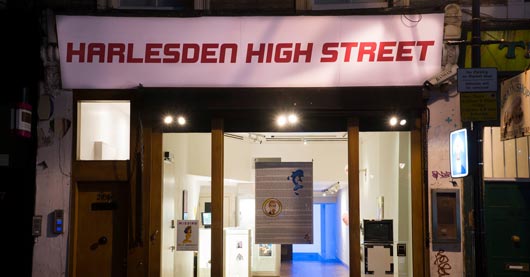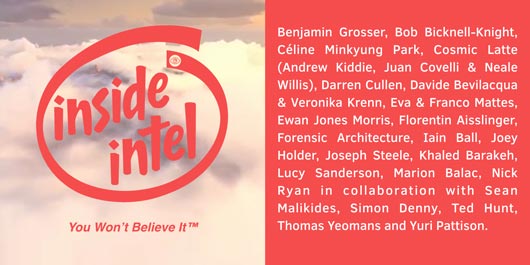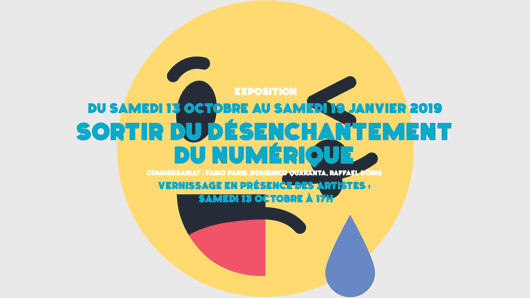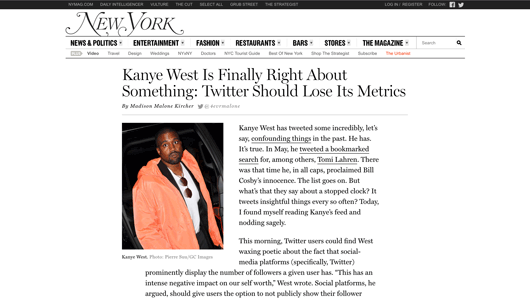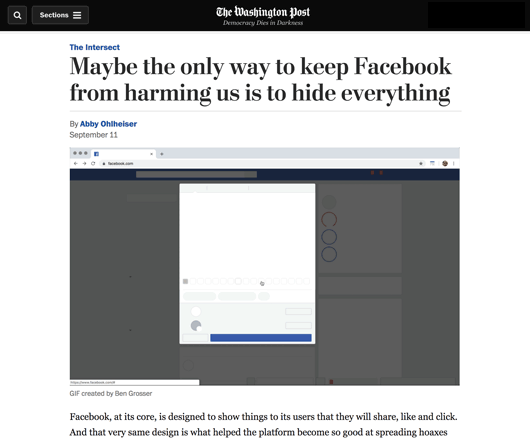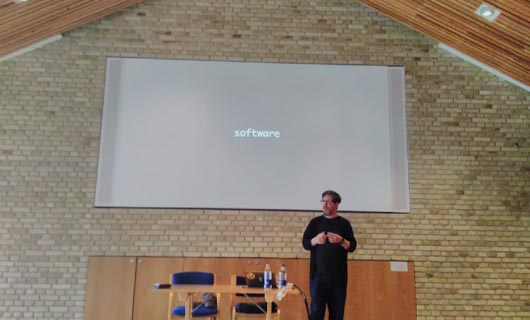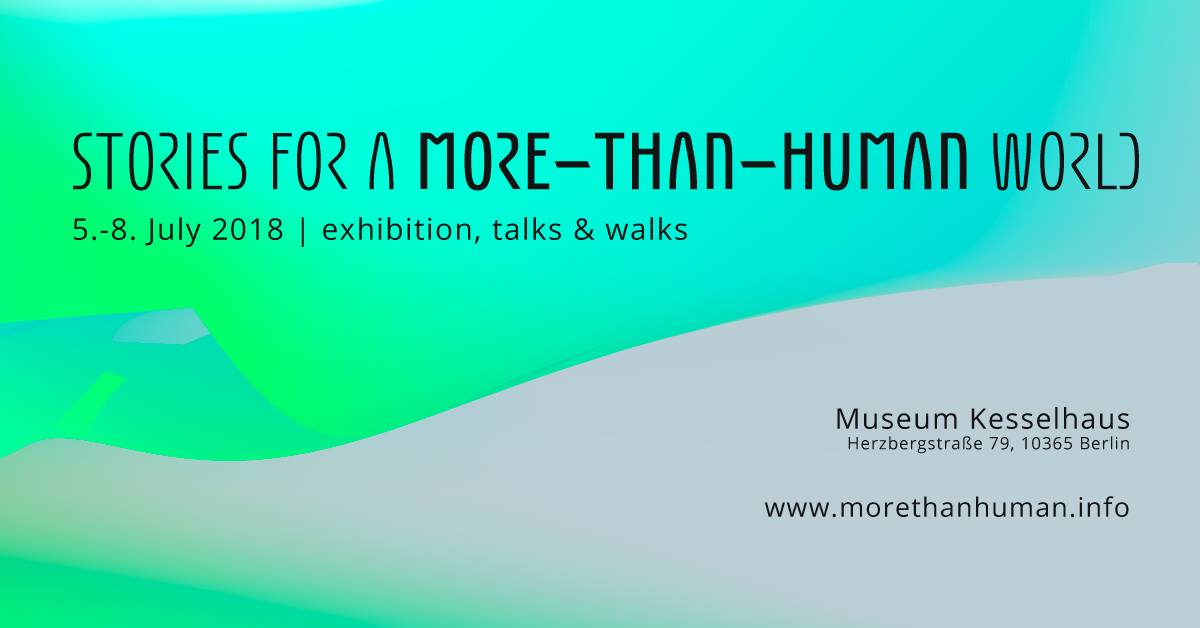My work Computers Watching Movies (American Beauty) will be part of an upcoming event at Harlesden High Street in London. This event is titled New Materialities in the Digital Age, and features a presentation and screening program by curator Doreen A. Ríos. The event is from 19:00-22:00 on 22 October, and is part of an opening for an exhibition that runs through 22 November.
Blog
ScareMail at Logan Symposium in London
ScareMail will be part of Inside Intel, an exhibition opening on 16 October as part of the Logan Symposium in London. Under the full title of Inside Intel: You Won’t Believe It™, the exhibition:
…presents a speculative “Silicon Valley Imagineering Laboratory,” a 21st century office interior thick with counter-narratives and factual misinformation. Exploring the landscape of contemporary media and technology, Inside Intel investigates their influence on conspiratorial thinking. Artistic methodologies presented in the show range from the architectural modeling of war crimes to speculative design, via browser-extensions and Twitter-bots, taking in both the satirical and the deeply unsettling. Whilst some artworks peddle faux state propaganda and sinister new technologies, others take the form of genuine investigations and purposefully staged analysis. The result is an environment where fact, fiction, and the theoretically possible seamlessly blur into one another. Mirroring the difficulties we all face when navigating the fog of electronic propaganda that pervades our new media ecosystems, Inside Intel demands an investigative eye to separate the signal from the noise.
Inside Intel is curated by Elliott Burns, Jake Charles Rees and India Murphy, and was commissioned in response to and to accompany the Centre for Investigative Journalism’s 2018 Logan Symposium: Conspiracy. It will be held at St James Hatcham, Goldsmiths, University of London, and is up from 16-20 October, 2018.
Go Rando at Espace Multimédia Gantner in France
Go Rando will be a part of Sortir du Désenchantement du Numérique (Escaping the Digital Unease) at Espace Multimédia Gantner in Bourogne, France. This next iteration—of an exhibition that last showed at Kunsthaus Langenthal in Switzerland—is curated by Raffael Dörig, Domenico Quaranta, and Fabio Paris. According to the curators:
While we’re using products by Apple, Amazon, Google, Facebook and find them useful and indispensable, we’ve become aware of the dominance of such big players. Their services form our thoughts and commodify the ideas of friendship and exchange. We do not surf the wild web anymore, but are fed with feeds, receiving more and more of the same, based on algorithmic extrapolations of our preferences. Since the beginning of the web, artists have built their own spaces and channels there. They have created artworks that react to commodification and restrictions in a critical way. The exhibition presents these alternatives.
The exhibition opens on 13 October and is up through 19 January 2018.
New York Magazine Discusses Kanye, Twitter, and My Years of Work on Social Media Demetrication
It’s an interesting moment—at least for me—because we’re starting to see increased calls for hiding the metrics on social media platforms. The latest was Kanye West, who tweeted that “we should be able to participate in social media without having to show how many followers or likes we have … [because these visible metrics have] an intense negative impact on our self worth.” Before Kanye, Jack Dorsey, the CEO of Twitter, suggested in testimony before the US Congress a couple weeks ago that he’s reconsidering the role of prominent visible follower counts. After Kanye’s tweet, Dorsey wrote Kanye telling him he’s still thinking about it.
Following Kanye’s tweet, New York Magazine wrote about Kanye’s call, and I appreciate that author Madison Malone Kircher foregrounded that I’ve been publicly calling for social media demetrication since 2012—when I created and released the first social media “demetricator” Facebook Demetricator—and have more recently made possible precisely what Kanye wants for Twitter with my Twitter Demetricator:
Metric-free social media isn’t a new concept. Ben Grosser, a professor of new media at the University of Illinois at Urbana-Champaign and artist, created an extension earlier this year called the Twitter Demetricator — an earlier version, the Facebook Demetricator launched in 2012 — which does exactly what West describes. It removes all follower and engagement counts and shows you only a user’s content. Which leaves you to judge that content purely on what you think of it, rather than what you think of it based on what your peers have indicated they think of it. “Without really meaning to, I’d been glossing over tweets that had relatively few likes and paying extra attention to those that had many. I had even subconsciously developed a sort of multiplier for various Twitter users based on the size of their followings, so that a tweet by a relatively obscure user that garnered 10 likes would stand out in my feed more than one by a famous user that got 100 likes,” Will Oremus at Slate wrote when he gave the extension a try. A 2014 academic study from Grosser described how his extensions “both reveals and eases these patterns of prescribed sociality, enabling a social media culture less dependent on quantification.
If only I could get Kanye to tweet out Twitter Demetricator, I suspect the attention it would produce for the idea of a metrics-free Twitter would help push Dorsey to implement what he has so far only spoken about as a future possibility. Heck, Dorsey himself could tweet out Twitter Demetricator as a way of asking for feedback on the idea! While I have no illusions that Facebook will ever hide the metrics, I’m starting to think it’s possible Twitter might do so. Time will tell…
Safebook in Washington Post and FastCoDesign
Both the Washington Post and Fast Company’s FastCoDesign discussed my latest work Safebook last week.
Abby Ohlheiser (WashPo) said Safebook was my “most drastic transformation of the platform,” diving into questions about what it would take to make Facebook “safe” in her article titled “Maybe the only way to keep Facebook from harming us is to hide everything.”
Kelsey Campbell-Dollaghan (FastCoDesign), in an article titled “Safebook is Facebook, except totally, gloriously empty,” called Safebook a “half elaborate send-up and half earnest investigation of the social network’s inner mechanisms.” And perhaps my favorite quote in a while: “The internet is a morass of things you don’t want to see, but can’t stop looking at. The artist Ben Grosser has a solution: Safebook.”
Ohlheiser and Campbell-Dollaghan are two of the most thoughtful journalists writing about social media from a critical perspective right now. If you aren’t already reading them, start today.
Please Don’t Like This! at Science Gallery London

My work Please Don’t Like This! (w/ Jonah Brucker-Cohen)
opens as part of HOOKED at Science Gallery London
My collaborative work with Jonah Brucker-Cohen, titled Please Don’t Like This!, is part of the inaugural exhibition of a new Science Gallery at King’s College London titled HOOKED. Curated by Hannah Redler Hawes, HOOKED “invites you to question what makes us as humans vulnerable to addiction and interrogates the underlying factors and routes to recovery. We invite you to challenge the stigmas associated with addiction, consider addiction as a health issue we are all susceptible to, and explore how recovery takes many forms.”
Looks like a great show and I’m happy to be a part of it. In case you’ll be in London this fall, stop by! It will be up from 21 September 2018 – 6 January 2019.
Invited Talk and Workshop in Denmark
At the end of August, I gave an invited talk and workshop at the University of Aarhus in Denmark (follow links for my abstracts). This was part of their SummerPIT (Participatory IT), a multidisciplinary conference focused on the role of participatory design in IT (info tech) contexts. There were speakers/attendees from a wide variety of fields, from CS/HCI to information science to media studies to new media art. I spoke on the day called Public Good(s) – Private Data.
The conference ended with a book launch for The Metainterface: The Art of Platforms, Cities, and Clouds, a fantastic book by Christian Ulrik Andersen and Søren Bro Pold and published by MIT Press. Highly recommended!
Computers Watching Movies at Museum Kesselhaus in Berlin
My work Computers Watching Movies will be part of Stories for a More-Than-Human World, opening 5 July at Museum Kesselhaus in Berlin. The exhibition includes:
…[works that] emphasize a non-anthropocentric shift and critically or playfully investigate understandings of being human, being machine, being hybrid in a present where the impact of technology – be it on the environment or on our own bodies – is ubiquitous. The theme of the event is a reaction to recent discussions between humanities and natural sciences about new approaches to thinking about, looking at, working with, and being inside nature. It draws references from fields of posthuman theory, new materialism, cybernetics and science and technology studies.
Stories for a More-Than-Human World is curated by Theresa Schubert, and is open through 8 July.
Get More at Science Gallery Detroit
My work Get More will be part of “Hustle” at Science Gallery Detroit. The venue’s inaugural show, Hustle is an “exhibition of interactive works and participatory experiences that examine the many definitions of survival and success, purpose and desire.” Hustle opens on 16 June and runs through 25 August.
Go Rando at the Moscow Museum of Modern Art
Go Rando is part of the recently opened exhibition “This Site is Under Revolution” at the Moscow Museum of Modern Art. Part of the 6th International Biennale of for Young Art, the exhibition “explores the power of minimal gestures to re-appropriate the virtual realm, critique and challenge uneven ways of representation that perpetuate dominant conventions based of privileged minorities.” The show is up through 22 July, and is curated by Barbara Cueto. Lots more info here.
